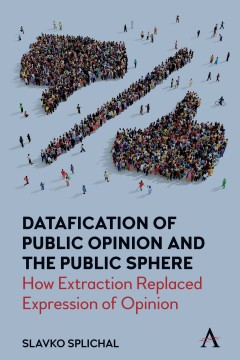Datafication of Public Opinion and the Public Sphere
How Extraction Replaced Expression of Opinion
By Slavko Splichal
Other Formats Available:
- About This Book
- Reviews
- Author Information
- Series
- Table of Contents
- Links
- Podcasts
About This Book
The book, anchored in stimulating debates on enlightenment ideas of the public that culminated and ended in the early 20th century, focuses on historical changes in the core phenomena of publicness: possibilities, conditions and obstacles to developing a public sphere in which publics create, articulate and express public opinion by means of reflexive publicity within an established democratic public culture. Specifically, it is focused on three central topics:
- a general historical transformation from “opining” – essentially some people’s view of what “the public” thought – through the identification of “public opinion” in opinion polls, up to the contemporary establishment of “what people think/want” using computer-based analysis of the big data available from digital records, in which the enlightenment idea of public expression of opinion has been replaced by the technology of extracting opinions;
- the origins and consequences, and the similarities and differences of the rise and fall of two related concepts – public opinion and the public sphere – in historically particular periods, which have in common that they both lie in the boundary area between normative-theoretical and empirical orientation and suffer from unreliable definition and operationalization, which can only be resolved by a closer connection between the two concepts and areas.
- a specific historical intervention created by the domestication of the German concept Öffenntlichkeit in English as “the public sphere,” heralding a new critical impetus in theory and research of publicness at a time when critical social thought sharply criticised and even abandoned the notion of public opinion due to its predominantly administrative use.
The book seeks to transcend the division into normative-critical theoretical conceptualisation and “constructive” empirical application in the social sciences to show how critical theory can be empirically applicable and empirical research normatively constructive, and to demonstrate the need for greater connectivity between them.
Reviews
“Slavko Splichal’s book is an excellent, outstanding, highly important and extremely topical analysis of how datafication has colonised publicness, public opinion, and the public sphere. This work is a must-read for everyone who cares about democracy and is interested in how we can save democracy and democratic communication(s) from the threats they face today.”—Professor Christian Fuchs, author of “Social Media: A Critical Introduction” and “Communication and Capitalism: A Critical Theory.”
“Slavko Splichal’s book is based on a historical perspective, Splichal provides a brilliant analysis of the impact of technological advances (polling, data and opinion mining, algorithms) on publicness combined with an urgent call for more complex and critical empirical research. Thought-provoking in its best sense.” —Professor Dr. Christina Holtz-Bacha, Friedrich-Alexander-Universität School of Business, Economics and Society, Nüremberg.
“Slavko Splichal writes with impressive intellectual depth, raising critical questions about what he describes as the datafication of the public sphere. The great value of this book is its sensitivity to long-term historical trends that have prevented the public from realising its democratic potential.”—Stephen Coleman, Professor of Political Communication, University of Leeds, UK.
Though the title might imply an empirical examination of data mining today, Splichal's book is more of an intellectual history of the concepts of “publicness” and “public sphere." He examines how scholars use these terms and considers how they apply to media and political communication now. Splichal (communications and public opinion, Univ. of Ljubljana, Slovenia) also touches on journalism and its current crisis, including citizens’ loss of trust in it and journalism's own loss of direction. One fundamental problem Splichal addresses is how publicness or public opinion can be used to democratically mediate between citizens and the government. He raises important points about the rise of survey research, after which opinions expressed privately were paradoxically labeled public opinion. Splichal is concerned about private control and the lack of true publicness in the means of public communication. It would be interesting to see more discussion of how much private interests control the knowledge gained through data mining. Thought provoking but difficult to parse.— J. Heyrman, Berea College
Author Information
Slavko Splichal is Professor of Communication and Public Opinion at the University of Ljubljana’s Faculty of Social Sciences, fellow of the Slovenian Academy of Sciences and Arts and member of Academia Europaea. He is founder and director of the European Institute for Communication and Culture and editor of its journal Javnost – The Public.
Series
Table of Contents
Prologue; List of Figures and Tables; Introduction; 1 The Rise of Public Opinion as the Voice of the People, Subversive Beginnings, Seeds of Doubt, Conceptual Challenges and Controversies in Sociology and Political Science; 2 Quantification of Public Opinion and the Disempowerment of the Public, The Quantitative Revolution in the Social Sciences, Polling: Operationalisation, Emanation or Negation of Public Opinion?, The Curse of Translation: The Invisible Becomes Visible; 3 Re-Emergence of Publicness in the Public Sphere, The Rediscovery of Critical Publicness ; The Perplexity of Publicness: Öffentlichkeitversus the Public Sphere; The Deliberative Turn and the Loss of the Public; Antagonists, Agonists, Mini-Publics and Publics as Actors in the Public Sphere; 4 Datafication of the Public Sphere and Threats to Publicness, The Rise of Opinion Mining and the ‘Networked Public Sphere’, Opinion Mining versus Polling, Technology and the Democratic Potentials of Publicness, Manipulating ‘Public Opinion’: From Propaganda Techniques to Invisible Algorithms; 5 Critical Epistemic Value of Publicness and Public-Worthiness, News Overload and Crisis of Journalism, Fostering Public Discourse: From Newsworthiness to Public-Worthiness, The Clash of Rationalities and the Need to Rehabilitate Publicness, Rearticulating the Critical Epistemic Value of Publicness: VARMIL, Conclusion, References, Index
Links
Stay Updated
Information
Latest Tweets



